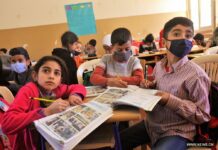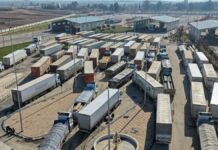
The Lebanese-Israeli conflict has escalated to its most dangerous point in years as Israel intensified its military campaign against Hezbollah strongholds in southern Lebanon, the Bekaa Valley, and the southern suburbs of Beirut. The ongoing airstrikes have caused significant casualties and displaced thousands of civilians, further destabilizing a region already on edge from prolonged tensions. As Israeli forces prepare for potential ground operations, the humanitarian toll deepens, with hundreds of civilians killed or wounded.
The Israeli Air Force has launched hundreds of strikes, targeting more than 300 Hezbollah positions since Monday morning, according to an Israeli army spokesperson. The strikes focus on Hezbollah’s military infrastructure, developed over the years, in an attempt to weaken the group’s operational capacity. The Israeli government has confirmed that it is prepared to escalate its efforts, including the possibility of a ground incursion, to neutralize Hezbollah’s ability to strike northern Israel.
“We will do whatever is necessary to return the residents of northern Israel to their homes safely,” Israeli military spokesman Admiral Daniel Hagari said. Israeli officials have urged Lebanese civilians living near Hezbollah facilities to evacuate, warning that these sites – often hidden within civilian buildings – will be targeted in the coming days.
The Lebanese Ministry of Health reported that over 100 people have been killed and more than 400 injured in the initial wave of bombings, which struck towns across southern Lebanon, including Tyre and Nabatieh. The dead and injured include women, children, and medical personnel. Hospitals in southern Lebanon have been overwhelmed, with non-emergency procedures postponed to focus on treating victims of the airstrikes.
The violence has triggered a mass exodus of civilians from southern Lebanon and the Bekaa Valley. Thousands are fleeing north toward Sidon and Beirut, while others are crossing the border into Syria, adding strain to already fragile regions. The Lebanese Ministry of Environment has begun a survey to track the displacement, with schools and shelters being opened to house those affected.
“The displacement is massive,” said Lebanese Environment Minister Nasser Yassin. “We are coordinating with international humanitarian agencies to ensure the needs of the displaced are met, but the situation is deteriorating rapidly.”
Hezbollah has retaliated with limited rocket fire into northern Israel, but the group has yet to fully engage in a large-scale confrontation. Military analysts suggest Hezbollah is attempting to adhere to established “rules of engagement” while avoiding a full-blown war. However, Israeli strikes are designed to force Hezbollah into a strategic retreat beyond the Litani River, according to Dr. Liqaa Makki, a senior researcher at Al Jazeera Center for Studies.
The group, a key player in Lebanon’s political and military landscape, is now facing unprecedented pressure. Hezbollah’s leader, Hassan Nasrallah, has vowed to continue resisting Israeli aggression, but the party is grappling with internal challenges, including a decline in public support due to its involvement in conflicts in Syria and Yemen.
The ongoing conflict has drawn sharp reactions from regional powers and international players. Dr. Samir Al-Taqi of the Middle East Institute explained that the US supports Israel’s efforts to reduce Hezbollah’s missile capabilities but is working to prevent the conflict from expanding beyond Lebanon. Washington is particularly concerned about the potential for Iranian involvement, though reports suggest that Iran, Hezbollah’s primary backer, has not authorized the group to escalate the confrontation into a full-scale war.
Domestically, Hezbollah’s actions are increasingly unpopular. Ali Al-Amin, editor-in-chief of the Janoubia website, emphasized that Hezbollah is facing growing isolation within Lebanon. Many Lebanese citizens blame the group’s militant activities for further entrenching Lebanon in regional conflicts and contributing to the country’s political and economic crises.
“Hezbollah is in a critical position,” Al-Amin said. “It must now choose between maintaining its military influence or facing even greater isolation domestically and internationally.”
Speculation about an Israeli ground offensive is growing, with Israeli Chief of Staff Herzi Halevi reportedly overseeing operations aimed at weakening Hezbollah’s foothold. Security sources told Israeli media that hundreds of aircraft are involved in coordinated strikes on Hezbollah’s command centers and weapons depots.
The international community is calling for restraint, but with Hezbollah and Israel both entrenched in their positions, the prospect of a prolonged conflict remains high. Without swift diplomatic intervention, the situation threatens to further destabilize Lebanon and ignite wider regional tensions.








